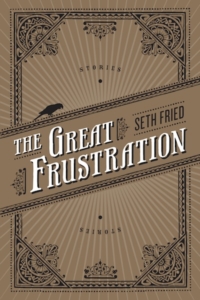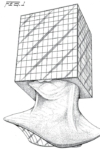[Soft Skull Press; 2011]
by Max Rivlin-Nadler
There’s nothing redeeming about just being clever, so it’s great that Seth Fried is also smart-as-hell in his debut, The Great Frustration, a collection that is fantastically imagined, caustically realized, and genuinely touching. The 11 stories are written in such a sympathetic and talented voice as to make the material described somehow believable (at least enough to suspend overwhelming skepticism about such madcap situations). Some of the more fantastic stories include: scientists who experience a sexual revolution while examining a prehistoric corpse, an annual picnic that ends with random acts of violence, an imaginary world of fauna, and the failure of plaid-wearing lackeys to put a monkey inside of a rocket.
The best moments though, the ones that resonate and make me excited to see where this young author goes, are the less fantastic, the ones where the characters struggle with Fried’s chosen topic, Frustration. In “The Scribes’ Lament,” a team of monks attempts to transcribe a performance of Beowulf by a murderously insane scholar. Incapable of producing a definitive account, the scribe realizes, “In the end, it was not just our failure as scribes that we were dealing with, but the failure of words to penetrate the solitude of human experience.” Fried exaggerates the reality of his stories to expose how impossible it is to represent our own interiors in writing, and how the struggle to represent our interior gives us art, but also burdens us with the engine that creates it — ecstatic frustration.
In the title story, Fried brings us back to the beginning, to the garden before the Fall. In the garden there is no want, so the predators, the cat drooling over the oblivious parakeet, are left only with an urgent frustration to devour one another. The air is thick with desire:
“Below, the lion does not lie with the lamb, but neither does it tear the lamb into a thousand pieces, neither does it eat the lamb’s head in a single bite, neither does it take the lamb into its jaws and, with all the force in the tremendous muscles of its neck, whip the lamb against a tree over and over again…”
In Fried’s stories, the prey are freed from their driveling survival: a parakeet happily surveys the wonderful garden, lab assistants finally indulge one another as they uniformly eschew work. His characters take moments to abandon survival and find brief pleasures. When you’re facing certain destruction (well, we all are) “there is a certain joy in being recognizable as oneself”. Even as you are about to be ripped to shreds, would you be able to split from your body, your inalienable self? In “Animalcula”, a strange guide to invented creatures, we receive the highest personification of impossible fauna I’ve encountered: creatures who whisk themselves into oblivion through emoting. Observers are encouraged by the author to sympathize with their feelings.
Despite these brief respites, despite fervent sexual activity, these underdogs always return to their initial dissatisfaction — the Fall is, and always will be, inevitable. In “The Siege”, the narrator, who awaits certain death at the hands of the surrounding horde (who’ve also provided safe haven for the wives of the damned town, and who, apparently, have no intention to ever finally attack), muses, “Our courage is akin to patience. No matter what kind of world is created for us, the mind will always be large enough to give refuge, and so our visions of the world will always have their place.” For the bullied, for the prey, for the breakfast morsels, there is the dignity of a sympathetic existence. Of an ability to escape their frustration through a vision of the world where, like the resistance to the inevitable violence at the annual picnic in “Frost Mountain Picnic Massacre,” it doesn’t have to be this way.
Fried concludes “The Great Frustration”, at the moment right before ruin. “They wait to be sent happily, savagely, into what’s next.” We are assured the world will follow the latter, but hope real hard for the former.
This post may contain affiliate links.








